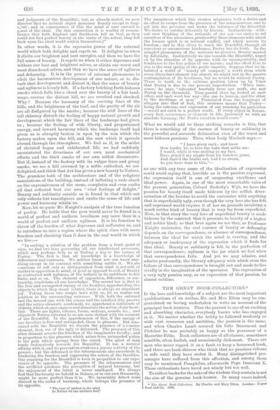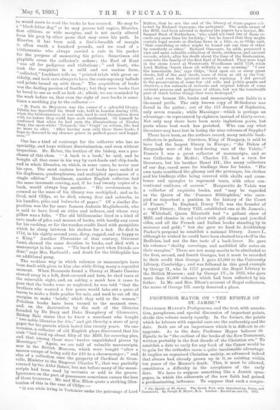THE GREAT BOOK-COLLECTORS.* IF the love and knowledge of a
subject are the most important qualifications of an author, Mr. and Mrs. Elton may be con- gratulated on having undertaken to write an account of the principal book-hunters. That the pursuit is one of an exciting and absorbing character, everybody knows who has engaged in it. No matter whether the hobby be followed modestly or with vast resources and ambition, the passion is the same, and when Charles Lamb secured his folio Beaumont and Fletcher he was probably as happy as the possessor of a Mazarine Bible. Book-collectors are of all classes; sometimes sensible, often foolish, and occasionally dishonest. There are men who never regard it as a fault to keep a borrowed book, and there are book-thieves who think that no precious volume is safe until they have stolen it. Many distinguished per- sonages have suffered from this affection, and among them may be mentioned Pamphilus, afterwards Pope Innocent X. These enthusiasts have loved not wisely but too well.
To collect books for the sake of the wisdom they contain is not the aim of the genuine book-hunter. In many cases indeed,
• Tho Great Book. Collectors. By Charles and Mary Elton. London: Kogan Paul and Co, 1883.
he would scorn to read the books he has secured. He may be "black-letter dog" or he may pursue tall copies, Elzevirs, first editions, or wide margins, and is not easily allured from his prey by other game that may cross his path. In Elzevirs, it has been said, a line's-breadth of margin is often worth a hundred pounds, and we read of a bibliomaniac who always carried a rule in his pocket for the purpose of measuring his prizes. Sometimes old playbills rouse the collector's ardour; the Earl of Kent "was all for pedigrees and visitations ; " and Scott, who took the complaint in a mild and not useless form, "Collected," Lockhart tells us, "printed trials with great as- siduity, and took care always to have the contemporary ballads and prints bound up with them." The acquisition of books was the darling passion of Southey ; but they were books that he loved to use as well as look at ; albeit, we are reminded by the work before us, that even the sight of rare books is some- times a soothing joy to the collector
" M. Paris de Moyzieux was the owner of a splendid library. Dibdin has described hie third sale, held in London during 1791, when the bibliomaniacs, it was said, used to cool themselves down with ice before they could face such excitement. Of himself he confessed that when he had seen the illuminations of Nicolas Jariy, the snow-white Petrarch,' the 'Virgil' on vellum, life had no more to offer. After having seen only these three books,
hope to descend to my obscure grave in perfect peace and happi- ness.'"
One has a kind of contempt for the collector who has no speciality, and buys without discrimination, and even without inspection. Mr. Reber, the brother of the bishop, was a pur- chaser of this class. "'A book is a book,' he said, and he bought all that came in his way by cart-loads and ship-loads, and in whole libraries, on which, in some cases, he never cast his eyes. The most zealous lovers of books have smiled at his duplicates, quadruplicates, and multiplied specimens of a single edition." Rawlinson, another English collector, had the same insensate craving, and, if he bad twenty copies of a book, would always buy another. "His covetousness in- creased as the mass of his library was multiplied; and as he lived, said Oldys, so he died, among dust and cobwebs, in his bundles, piles and bulwarks of paper." Of a similar dis- position was the far more famous Antonio Magliabeechi, who is said to have lived on titles and indexes, and whose very pillow was a folio. "The old bibliomaniac lived in a kind of cave made of piles and masses of books, with hardly any room for his cooking, or for the wooden cradle lined with pamphlets which be slung between his shelves for a bed. He died in 1714, in his eighty-second year, dirty, ragged, and as happy as a King." Another Florentine of that century, Giovanni Lanni, showed the same devotion to books, and died with a manuscript in his arms. " 'Tis hard to part when friends are dear," says Mrs. Barbauld ; and death for the bibliophile has an additional pang. The reckless way in which volumes or manuscripts have been dealt with gives to him also while living many a regretful moment. When Boccaccio found a library at Monte Cassino stowed away in a loft, dust-covered and torn, he abed tears at the miserable sight, and, on asking a monk how it came to Pass that the books were so neglected, he was told "that the brothers who wanted a few pence would take out a quire of leaves to make a little psalter for sale, and used to out oft the margins to make briefs,' which they sold to the women." Priceless books have been turned to the meanest uses; and, on the destruction by the mob of the libraries founded by De Bury and Duke Humphrey of Gloucester, Bishop Bale states that he knew a merchant who bought "two noble libraries for 40a.," and got thereby a store of grey paper for his parcels which lasted him twenty years. On one occasion, a collector of old English plays discovered that his
cook "bad used up about fifty of the MSS. for covering pies, and that
Massinger.a'131" " g theni were twelve unpublished pieces by
now in the BrAitsgiahin' we are told of valuable manuscripts, Museum, which were bought "after a narrow escape of being sold for 210 to a cheesemonger ; " and
also of a collection once the property of Cardinal de Gran- velle, Minister to the Emperor Charles V., that was partially rescued by the Abb6 Boisot, but not before many of the manu- scripts bad been used by servants or sold to the grocer. Ignorance on the part of possessors sometimes causes the loss
of these treasures. Mr. and Mrs. Elton quote a striking illus- tration of this in the case of OldYB:—• " It was while living in Yorkshire under the patronage of Lord Mahon, that he saw the end of the library of State papers col- lected by Richard Gascoyne, the antiquary. The noble owner of
the MSS. had been advised to destroy the papers by a lawyer, Mr. Samuel Buck of Rotherham, who could not read one of these re-
cords any more than his lordship ;' but he feared that they might contain legal secrets or disclose flaws in a title, or, as Oldys said, 'that something or other might be found out one time or other by somebody or other.' Richard Ga.scoyne, he adds, possessed a vast and most valuable collection of deeds, evidences, and ancient records, which, after his death about the time of the Restoration, came into the family of the first Earl of Strafford. They were kept in the stone tower at Wentworth Woodhouse until 1728, when Lord Mahon ' burnt them all wilfully in one morning.' 'I saw the lamentable fire,' says Oldys, feed upon six or seven great chests, full of the said deeds, some of them as old as the Con- quest, and even the ignorant servants repining. I did prevail to the preservation of seine few old rolls and public grants and charters, a few extracts of escheats and original letters of some eminent persons and pedigrees of others, but not the hundredth part of much better things that were destroyed."
Like our human life, books and manuscripts are liable to a thousand perils. The only known copy of Heliodorus was found in the gutter; out of the 113 dramas of Sophocles, only seven remain ; while Massinger—which is perhaps an advantage—is represented by eighteen instead of thirty-seven. Not only may there have been mute inglorious poets, but poets whose best work has perished. Who can say what literature may have lost in losing the nine volumes of Sappho There have been, as the authors record, many notable book.
collectors in palaces. Corvinus, King of Hungary, is said to have had the largest library in Europe ; "the Dukes of Burgundy were of the book-loving race of the Valois;" Francis I. was a great collector of manuscripts, and so
was Catherine de Medici; Charles IX. had a turn for literature, but his brother Henri III., like many collectors of our day, cared more for bindings than for books. "His own taste combined the gloomy and the grotesque, his clothes
and his bindings alike being covered with skulls and cross- bones and spangles to represent tears, with other con- ventional emblems of son-ow." Marguerite de Valois was a collector of exquisite books, and "may be regarded as the Queen of the Femmes Bibliophiles,' who occu- pied so important a position in the history of the Court of France." In England, Henry VII. was the founder of a royal library ; Henry VIII. established one at St. James's ; at Whitehall, Queen Elizabeth had "a gallant show of MSS. and classics in red velvet with gilt clasps and jewelled sides, and all the French and Italian books standing by in morocco and gold;" but she gave no heed to Archbishop Parker's proposal to establish a national library. James I., although he wished he could have been chained to a shelf in the Bodleian, had not the fine taste of a book-lover. He gave his volumes "shabby coverings, and scribbled idle notes on their margins." There are not many merits to be attributed to the first, second, and fourth Georges, but it must be recorded to their credit that George I. gave 25,000 to the University Library, Cambridge ; and was followed in this good example by George II., who in 1757 presented the Royal Library to the British Museum ; and by George IV., in 1823, who gave more than 65,000 volumes which had been collected by his father. In Mr. and Mrs. Elton's account of Royal collectors, the name of George III. surely deserved a place.







































 Previous page
Previous page